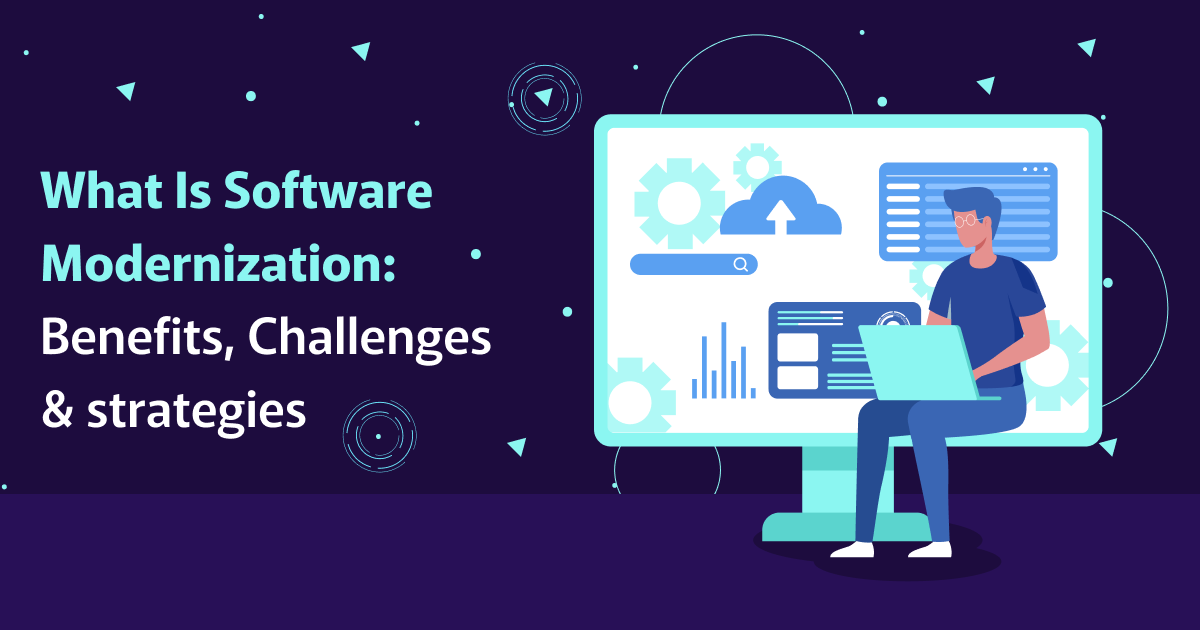Robotic Process Automation (RPA) has become a buzzword in the world of business. The emergence of artificial intelligence (AI) has significantly changed the traditional ways of doing business. With Artificial Intelligence technology, automating repetitive tasks is pretty simple.
RPA is one of the latest AI trends that has revolutionized business operations. It is a software used to automate standardized and repetitive human tasks to streamline business processes. It optimizes the performance of employees and thus, increases business productivity.
The global market size of RPA was USD 1.89 billion in the year 2021. The numbers are expected to go up by 38.2% by the end of 2030. That speaks about the demand for robotic process automation in the business sector.
The spectacular benefits of RPA are the main reasons for its growing demand. Whether you are in the supply chain, insurance, healthcare, or finance industry, you will experience the benefits of RPA.
In this blog, you will get to know about the top benefits of RPA and how it can be implemented for your business.
Why Is RPA Important For Your Business?
Leveraging technologies like AI, IoT, RPA benefits businesses in several ways. Automating mundane tasks saves time and effort for humans. Here are some of the top benefits that computer software brings to businesses in diverse sectors:
- RPA minimizes human interventions and lowers the risk of errors.
- It allows businesses to direct their employees to critical functions.
- It promotes better cost savings for businesses.
- It maximizes the overall efficiency and productivity of businesses.
How To Implement RPA In Business?
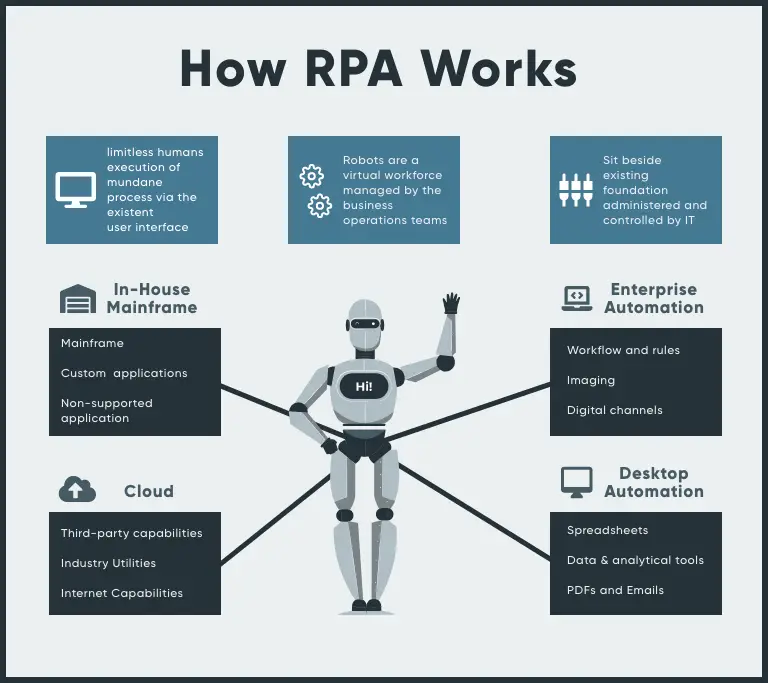
If you are ready to leverage the power of RPA for your business, it is important to know the implementation process.
Here are the essential steps you need to follow for the effective execution of Robotic Process Automation in business:
| 1. | Identify the Processes to be Automated | It isn’t wise to automate all the business processes through RPA. It is because some processes require human intelligence for better outcomes. So, the first step is to list down all the business processes you want to automate. Be sure to be rational in your decision-making. |
| 2. | Conduct Feasibility Assessment | Feasibility assessment determines the level up to which the business processes can be automated. Businesses would require an RPA expert to perform the assessment. |
| 3. | Readjust | It isn’t wise to automate all the business processes through RPA. This is because some processes require human intelligence for better outcomes. So, the first step is to list down all the business processes you want to automate. Be sure to be rational in your decision-making. |
| 4. | Collect User Stories | User stories allow businesses to understand the specific requirements of the users. Document detailed descriptions of all the business processes. |
| 5. | Develop and Test the RPA Process | With the help of RPA experts, businesses can start developing robotic process automation solutions. Based on the specific needs of the business, the professionals will leverage the right RPA tools. After the development of RPA solutions, they need to be tested in different scenarios. It will help in the identification of potential bugs. |
| 6. | Reconfirmation and Deployment | In the final step, the RPA developers will fix the identified bugs and ensure that the solutions are bug-free. Then the RPA solutions will be deployed. |
What Are The Major Benefits of RPA For Your Business?
- Increased Efficiency
Increased efficiency is one of the major benefits of RPA. Humans can work up to a certain extent and for specific hours only. Moreover, the need for breaks and sickness further lowers their efficiencies.
However, it is not the same with RPA. It can be used by businesses 365 days and 24/7. It helps in the completion of more tasks in less time.
- Improved Accuracy
When different business operations are carried out by humans, there is always a risk of error. Correcting manual errors can be quite time-consuming and taxing. Moreover, some mistakes may prove to be costly for businesses.
To overcome all such hassle, implementing RPA is the best solution. It minimizes the risk of errors and improves accuracy significantly.
As the business tasks are done by the software, you can expect timeliness and accuracy. For the best outcomes, testing RPA is vital.
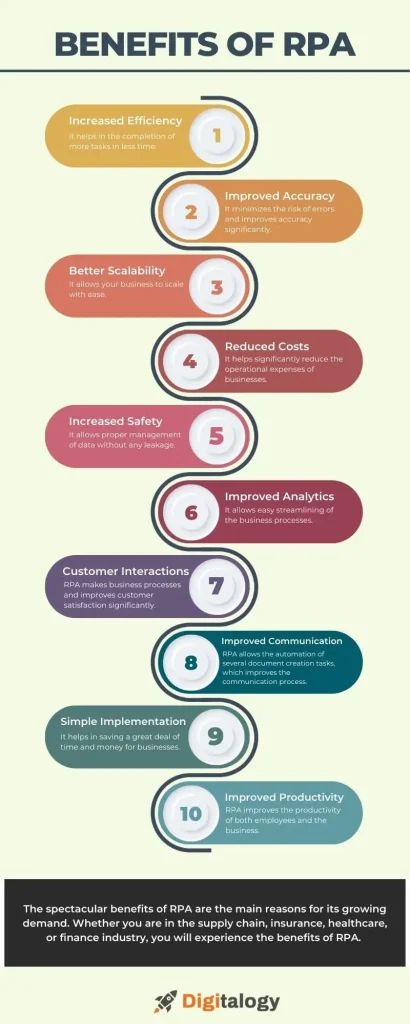
- Better Scalability
Every business scales up with time. With the expansion of your business, your tasks and responsibilities will also increase. Managing the increased functions can be very challenging for your employees.
In such a situation, RPA can help. It allows your business to scale with ease. By automating several functions, the software enables businesses to expand successfully and achieve the desired goals.
- Reduced Costs
Every business focuses on ways to lower its costs and improve its revenues. Implementing RPA can promote better cost savings.
Robotic process automation handles several complex tasks and lowers the risk of errors. It helps significantly reduce the operational expenses of businesses.
No doubt, the upfront cost of implementing RPA is a little expensive. However, it can enable your business to save more in the long run and offer more profits.
- Increased Safety
One of the significant benefits of RPA for your business is increased safety.
Wondering how it enhances security? An important security concern of every business is the leakage of data. With the increase in cybersecurity risks, your business data is vulnerable to attacks by hackers.
To secure your sensitive business data, implementing RPA is the best thing to do. It allows proper management of data without any leakage.
It permits only authorized users to access the data and log out once the tasks are over. Moreover, the log file helps in recording all the activities, thereby making it easy for the business to identify any potential risks.
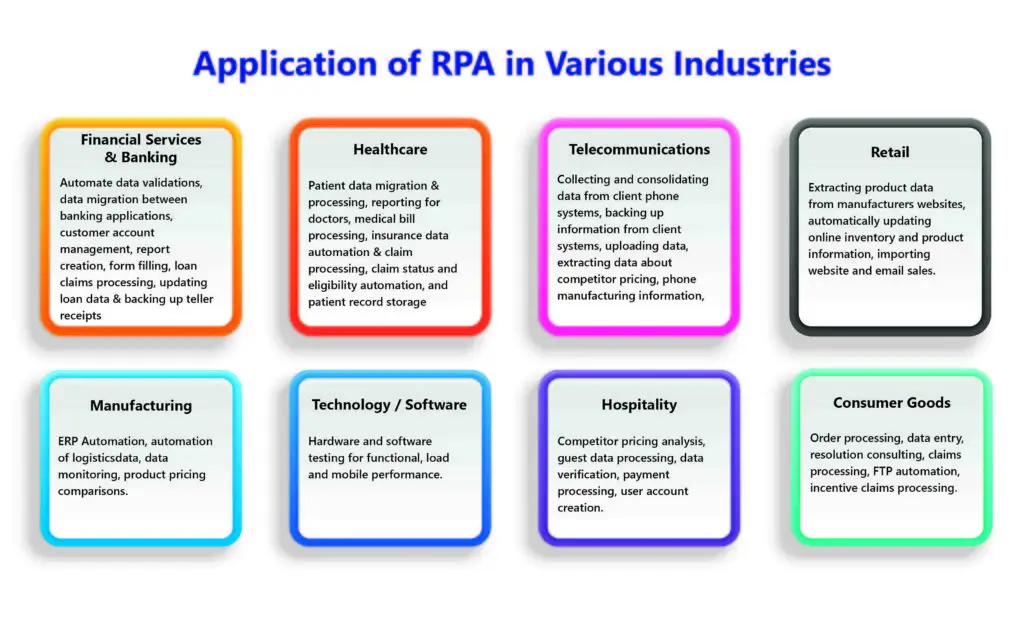
- Improved Analytics
RPA enables businesses to collect important data vital for effective decision-making. Some of the information that the software can collect includes errors, exceptions, work volume data, and cycle times.
It makes all the information available in one place and helps in faster and more effective decision-making. It allows easy streamlining of the business processes.
Moreover, gaining access to the required analytics makes it possible for businesses to improve their product and services. It ultimately enables them to succeed better in the target market.
- Better Customer Interactions
Customers are important for every business and satisfying them is the main goal. Implementing RPA can help you achieve this goal. RPA makes business processes and improves customer satisfaction significantly.
Moreover, it can effectively handle several customer requests automatically, thereby enhancing customer experiences. With the improvement in customer satisfaction, their loyalty toward your business is sure to increase.
- Improved Communication
Improved communication is another benefit of robotic process automation. RPA allows the automation of several document creation tasks. It can even automate document modifications.
As a result, employees do not have to update the minute details from time to time. Through on-time updates, RPA ensures that end-users and on-field workers can access the latest information.
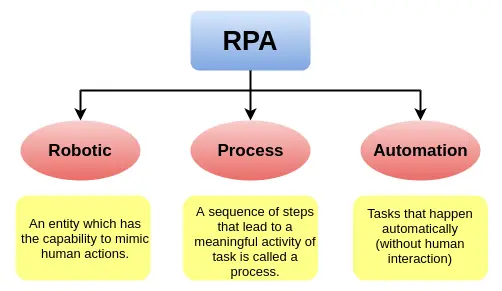
- Simple Implementation
When it comes to the benefits of RPA, simple RPA implementation of the software is a prominent one. It is quite easy to deploy RPA without the need for any API configuration. It helps in saving a great deal of time and money for businesses.
- Improved Productivity
The use of Python in RPA contributes to flexibility and robustness. It provides several libraries and frameworks, such as Automation Anywhere, UiPath, and PyAutoGUI, which enable Python developers to automate repetitious tasks and streamline business processes.
By automating tasks and lowering human intervention, RPA improves the productivity of both employees and the business. With the use of RPA, your employees can complete routine tasks in much less time and improve their productivity.
The improvement of employee productivity automatically boosts the success of businesses and enables them to stay ahead of the competition.
What Are The Common Disadvantages Of RPA?
RPA brings a lot of benefits to businesses. However, it also has some drawbacks too. As per the experts in RPA technology, the solution can’t work in isolation. That means to ensure the successful enforcement of RPA; businesses must come up with a well-developed AI plan.
Careful planning and designing of the architecture are at the core of robotic process automation execution in business. Moreover, some businesses may face challenges during the implementation of RPA.
Lack of business case clarity, unavailability of appropriate talent, and disruption are some of the potential challenges businesses may experience.
Conclusion
RPA application has become vital for many businesses in different industries. Automating repetitive processes offers several benefits to businesses. Make sure to have an appropriate strategy in place before starting the implementation process. Leverage RPA and gain a competitive advantage in your industry.
What’s your take on RPA implementation? Share your views in the comment section!
FAQs
What are the main sectors that use RPA?
RPA is mainly used in industries like banking, insurance, healthcare, telecommunication, and manufacturing.
How does RPA help the healthcare industry?
RPA helps in maintaining easy records of patient data, automating medical bill processing, enhancing the claim process, and saving costs.
Can the retail sector use RPA?
Yes, the retail sector can use RPA. It allows easy extraction of data, importing email sales, updating inventory, and modifying or updating product information.




